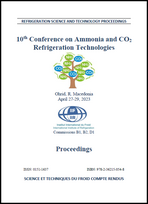
Document IIF
Conception préliminaire du système de chauffage urbain modernisé utilisant des pompes à chaleur avec des frigorigènes CO2 et NH3.
Preliminary design of the retrofitted district heating system using heat pumps with CO2 and NH3 refrigerants.
Numéro : 0014
Auteurs : POŽGAJ D., PAVKOVIC B., DELAC B.
Résumé
The use of heat pumps with natural refrigerants in existing district heating systems is a recognized technology that leads to a low-carbon transition and a reduction in the use of fossil fuels. This paper presents a preliminary design for the renovation of the existing district heating system using heat pumps with natural refrigerants CO2 and NH3. The city of Rijeka has several decentralized district heating systems, and one of the systems considered in this case study produces heating energy and domestic hot water using natural gas-fired hot water boilers. The dynamic model of the district heating system, which includes the building simulation, the distribution network, and the energy generation subsystem, was used to investigate alternatives for retrofitting the thermal energy production subsystem. The aim of the present study is to evaluate the required operating temperature, to adapt the whole system for the use of heat pumps and to compare heat pumps with natural refrigerants and those with HFO and HFC refrigerants.
Documents disponibles
Format PDF
Pages : 8
Disponible
Prix public
20 €
Prix membre*
Gratuit
* meilleur tarif applicable selon le type d'adhésion (voir le détail des avantages des adhésions individuelles et collectives)
Détails
- Titre original : Preliminary design of the retrofitted district heating system using heat pumps with CO2 and NH3 refrigerants.
- Identifiant de la fiche : 30030973
- Langues : Anglais
- Sujet : Technologie
- Source : 10th IIR Conference on Ammonia and CO2 Refrigeration Technologies.
- Date d'édition : 27/04/2023
- DOI : http://dx.doi.org/10.18462/iir.nh3-co2.2023.0014
Liens
Voir d'autres communications du même compte rendu (38)
Voir le compte rendu de la conférence
Indexation
-
Thèmes :
Techniques des pompes à chaleur;
CO2;
Ammoniac;
HFO et HCFO - Mots-clés : Chauffage urbain; R717; R744; Pompe à chaleur; Frigorigène naturel; COP; Conversion; Étude de cas; Simulation; Comparaison; R1234ze; Coût; Croatie
-
Performance optimization of a large-scale ammon...
- Auteurs : JØRGENSEN P., OMMEN T., MARKUSSEN W. B., et al.
- Date : 11/04/2019
- Langues : Anglais
- Source : 8th Conference on Ammonia and CO2 Refrigeration Technology. Proceedings: Ohrid, North Macedonia, Avril 11-13, 2019.
- Formats : PDF
Voir la fiche
-
Design considerations for dynamically operated ...
- Auteurs : MEESENBURG W., KOFLER R., OMMEN T., et al.
- Date : 24/08/2019
- Langues : Anglais
- Source : Proceedings of the 25th IIR International Congress of Refrigeration: Montréal , Canada, August 24-30, 2019.
- Formats : PDF
Voir la fiche
-
Large Heat Pumps for Decarbonized District Heat...
- Auteurs : FUNDER-KRISTENSEN T., TURNER D., ZHANG L.
- Date : 31/08/2021
- Langues : Anglais
- Source : 13th IEA Heat Pump Conference 2021: Heat Pumps – Mission for the Green World. Conference proceedings [full papers]
- Formats : PDF
Voir la fiche
-
Experimental assessment of the use of R515B as ...
- Auteurs : COLOMBO L. P. M., FRIGERIO D., LUCCHINI A., MOLINAROLI L.
- Date : 21/08/2023
- Langues : Anglais
- Source : Proceedings of the 26th IIR International Congress of Refrigeration: Paris , France, August 21-25, 2023.
- Formats : PDF
Voir la fiche
-
Mapping of coefficient of performance for large...
- Auteurs : JØRGENSEN P., OMMEN T., MARKUSSEN M., et al.
- Date : 24/08/2019
- Langues : Anglais
- Source : Proceedings of the 25th IIR International Congress of Refrigeration: Montréal , Canada, August 24-30, 2019.
- Formats : PDF
Voir la fiche
